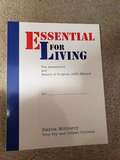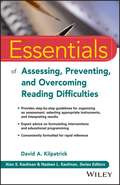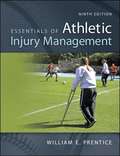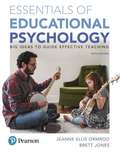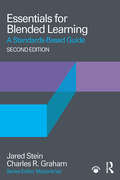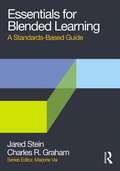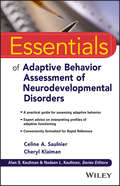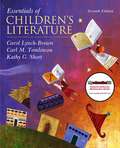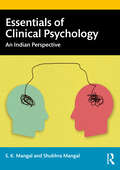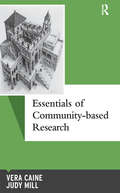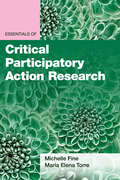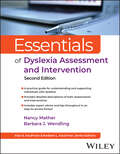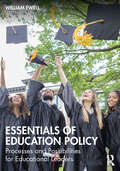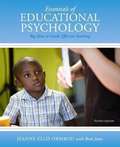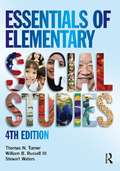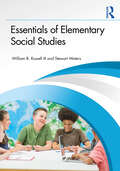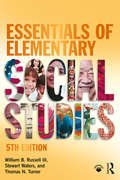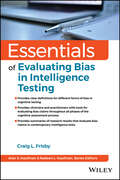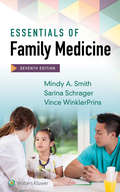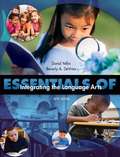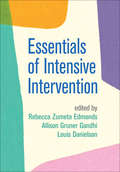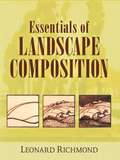- Table View
- List View
Essential for Living: The Assessment and Record of Progress [ARP] Manual
by Patrick McGreevyEssential for Living is a communication, behavior, and functional skills assessment, curriculum, and skill-tracking instrument for both children and adults with moderate-to-severe disabilities. It is especially useful for learners with limited communication repertoires, minimal daily living skills, or severe problem-behavior. This instrument is based on concepts, principles, and empirically-validated procedures from Applied Behavior Analysis (ABA) and from B. F. Skinner's ground-breaking analysis of verbal behavior (Skinner, 1957). <p><p>Essential for Living is both an assessment and a curriculum, it is used to determine the current performance level of each child or adult with respect to skills that are part of the instrument, in other words, to conduct a curriculum-based assessment. This instrument is also used to develop appropriate goals, and objectives for individual education or support plans and to track skill acquisition and problem behavior. Essential for Living is not a developmental instrument and it is neither age, nor grade-referenced. That is, it does not include skills arranged in an order in which they are often acquired by typically developing children, and sets of skills within in this order are not categorized by age or grade. <p><p>By contrast, The Verbal Behavior Milestone Assessment and Placement The VB-MAPP (Sundberg, 2008) is an excellent example of a developmental assessment, curriculum, skill-tracking instrument, and IEP development guide, which is also based on concepts, principles, and empirically-validated procedures from Applied Behavior Analysis (ABA) and B. F. Skinner's analysis of verbal behavior (Skinner, 1957). The developmental levels in the VB-MAPP are also age-referenced. Essential for Living is composed of functional skills, and behaviors, which are essential for effective daily living and which result in an improved quality of life for children and adults.
Essentials Of Assessing, Preventing, And Overcoming Reading Difficulties (Essentials Of Psychological Assessment Ser.)
by David KilpatrickPractical, effective, evidence-based reading interventions that change students' lives Essentials of Understanding and Assessing Reading Difficulties is a practical, accessible, in-depth guide to reading assessment and intervention. It provides a detailed discussion of the nature and causes of reading difficulties, which will help develop the knowledge and confidence needed to accurately assess why a student is struggling. Readers will learn a framework for organizing testing results from current assessment batteries such as the WJ-IV, KTEA-3, and CTOPP-2. Case studies illustrate each of the concepts covered. A thorough discussion is provided on the assessment of phonics skills, phonological awareness, word recognition, reading fluency, and reading comprehension. Formatted for easy reading as well as quick reference, the text includes bullet points, icons, callout boxes, and other design elements to call attention to important information. <p><p> Although a substantial amount of research has shown that most reading difficulties can be prevented or corrected, standard reading remediation efforts have proven largely ineffective. School psychologists are routinely called upon to evaluate students with reading difficulties and to make recommendations to address such difficulties. This book provides an overview of the best assessment and intervention techniques, backed by the most current research findings. <p> Bridge the gap between research and practice Accurately assess the reason(s) why a student struggles in reading Improve reading skills using the most highly effective evidence-based techniques Reading may well be the most important thing students are taught during their school careers. It is a skill they will use every day of their lives; one that will dictate, in part, later life success. Struggling students need help now, and Essentials of Understanding and Assessing Reading Difficulties shows how to get these students on track.
Essentials Of Athletic Injury Management
by William E. Prentice Daniel D. ArnheimEssentials of Athletic Injury Management is written at a level more appropriate for the coach, fitness professional, and physical educator. It provides guidance, suggestions, and recommendations for handling athletic health care situations when an athletic trainer or physician is not available.
Essentials Of Educational Psychology: Big Ideas To Guide Effective Teaching
by Jeanne Ormrod Brett JonesFocused on the big ideas of education psychology, this text gives readers a practical understanding of the core concepts in educational psychology and of the research-based strategies needed to facilitate student learning and development.
Essentials for Blended Learning, 2nd Edition: A Standards-Based Guide (Essentials of Online Learning)
by Charles R. Graham Jared SteinEssentials for Blended Learning provides a practical, streamlined approach for creating effective learning experiences by blending online activities and the best of face-to-face teaching. Effective blended learning requires rethinking of teaching practices and a redesign of course structure. Suitable for instructors in any content area, this book simplifies these difficult challenges without neglecting important opportunities to transform teaching. The revised second edition is more streamlined and easier to use, and includes more real-world examples of blended teaching and learning, the latest technologies, and additional research-based learning activities.
Essentials for Blended Learning: A Standards-Based Guide (Essentials of Online Learning)
by Charles R. Graham Jared SteinEssentials for Blended Learning: A Standards-Based Guide provides a practical, streamlined approach for creating effective learning experiences by blending online activities and the best of face-to-face teaching. This guide is: Easy to use: Clear, jargon-free writing; illustrations; and references to online resources help readers understand concepts. Streamlined: A simple but effective design process focuses on creating manageable activities for the right environment. Practical: Real-world examples from different subject areas help teachers understand principles in context. Contemporary: The variety of modern, connected technologies covered in the guide addresses a range of teaching challenges. Forward-Looking: The approach bridges the gap between formal classroom learning and informal lifelong learning. Standards-based: Guidelines and standards are based on current research in the field, relevant learning theories, and practitioner experiences. Effective blended learning requires significant rethinking of teaching practices and a fundamental redesign of course structure. Essentials for Blended Learning: A Standards-Based Guide simplifies these difficult challenges without neglecting important opportunities to transform teaching. This guide is suitable for teachers in any content area. Please visit www.essentialsforblended.com for additional resources.
Essentials of Adaptive Behavior Assessment of Neurodevelopmental Disorders (Essentials of Psychological Assessment)
by Celine A. Saulnier Cheryl KlaimanA practical guide to adaptive behaviors across a range of neurodevelopmental disorders Adaptive behavior assessment measures independent living skills, including communication, social skills, personal care, and practical work skills. For individuals with intellectual disabilities, evaluation of these skills is a critical tool for measuring eligibility and can identify specific skills that must be learned before effective educational interventions can be implemented. Essentials of Adaptive Behavior Assessment of Neurodevelopmental Disorders describes the role of adaptive behavior in assessment and treatment, and provides clear guidance for measurement. Case samples provide real-world illustration of behaviors and assessment, and systematic comparison of various measures are presented and explained to better inform planning. Individual chapters outline specific adaptive behaviors across a range of neurodevelopmental disorders, giving clinicians, practitioners, students, and researchers a better understanding of diagnostic differentials and how to place independent skill programming in treatment and intervention. Plan intervention and treatment based on accessible measurement guidelines across a range of disorders Gain a deeper understanding of adaptive functioning specific to ADHD, autism spectrum disorders, disruptive behavior disorders, and genetic disorders Compare and contrast current measures to evaluate their strengths, weaknesses, and areas of overlap Quickly locate essential information with Rapid Reference and Caution boxes For individuals with neurodevelopmental disorders, adaptive behaviors are the keys to independence; without them, these individuals will perpetually struggle with achieving optimum independence without the basic skills needed to function at home, in school, and in the community. Assessment allows these skills to be factored in to treatment and intervention planning, and can help improve the outcomes of other intervention methods. Essentials of Adaptive Behavior Assessment of Neurodevelopmental Disorders clarifies the assessment of these important behaviors, helping clinicians make more informed decisions around diagnosis, education, and treatment planning.
Essentials of Chemical Education
by Siegbert Schmid Günther Harsch Hannah Gerdau Hans-Dieter BarkeFor everybody teaching chemistry or becoming a chemistry teacher, the authors provide a practice-oriented overview with numerous examples from current chemical education, including experiments, models and exercises as well as relevant results from research on learning and teaching. With their proven concept, the authors cover classical topics of chemical education as well as modern topics such as every-day-life chemistry, student's misconceptions, the use of media or the challenges of motivation. This is the completely revised and updated English edition of a highly successful German title.
Essentials of Children's Literature (Seventh Edition)
by Carol Lynch-Brown Carl M. Tomlinson Kathy G. Short'Essentials of Children's Literature' is a brief, affordable, comprehensive textbook with rich resources-- a true compendium of information about children's literature. It is tailored to a survey course in children's literature but, by virtue of its brevity and affordability, is also suitable as a companion text in an integrated language arts course.
Essentials of Clinical Psychology: An Indian Perspective
by Shubhra Mangal S. K. MangalEssentials of Clinical Psychology: An Indian Perspective offers a comprehensive, user-friendly introduction to the theory and practice of clinical psychology within an Indian cultural, social, and educational context. The book starts with an introduction of what Clinical Psychology is and what it looks like in practice, giving a review of its history and contemporary traditions with an essential emphasis on its development from both a global as well as the Indian perspective. The following chapters cover a range of topics such as research methods, mental health and hygiene, and clinical psychology functions and training. The second half of the book then focuses on the classification of mental disorders for knowledge in diagnosing and treating patients, with chapters devoted to the description of various types of behavioral and mental disorders appearing in the Diagnostic and Statistical Manual of Mental Disorders (DSM) and the International Classification of Diseases (ICD). Disorders examined include eating disorders, sleep disorders, degenerative disorders, psychotic disorders, and neurodevelopmental disorders. Each chapter ends with chapter summaries, review questions, and recommended readings. Each chapter has its sectionwise summaries and ends with review questions and cited references. This textbook will serve as a must-have reference for all undergraduate and postgraduate students interested in Clinical Psychology, as well as for candidates selecting Psychology as their optional paper in competitive examinations. The book is designed according to Indian university course syllabi but also provides a guide to anyone looking to understand the current state of study and practice within Indian Clinical Psychology.
Essentials of Community-based Research (Qualitative Essentials #11)
by Vera Caine Judy MillCommunity-based research (CBR) is the most commonly used method for serving community needs and effecting change through authentic, ethical, and meaningful social research. In this brief introduction to CBR, the real-world approach of noted experts Vera Caine and Judy Mill helps novice researchers understand the promise and perils of engaging in this research tradition. This book • outlines the basic steps and issues in the CBR process—from collaboratively designing and conducting the research with community members to building community capacity; • covers how to negotiate complicated questions of researcher control and ethics; • includes a chapter written by community partners, among the examples from numerous projects from around the world.
Essentials of Critical Participatory Action Research (Essentials of Qualitative Methods Series)
by Michelle Fine María Elena TorreThe brief, practical texts in the Essentials of Qualitative Methods series introduce social science and psychology researchers to key approaches to qualitative methods, offering exciting opportunities to gather in-depth qualitative data and to develop rich and useful findings. In this book, Michelle Fine and Maria Elena Torre provide an introduction to critical participatory action research, an approach that reveals the everyday stories of struggle and survival of the persons being studied, combats social injustice, and leverages social science research for action. Critical participatory action research challenges the narrow ways in which research has traditionally been conducted, and elevates the voices and perspectives of formerly marginalized groups.About the Essentials of Qualitative Methods book series: Even for experienced researchers, selecting and correctly applying the right method can be challenging. In this groundbreaking series, leading experts in qualitative methods provide clear, crisp, and comprehensive descriptions of their approach, including its methodological integrity, and its benefits and limitations. Each book includes numerous examples to enable readers to quickly and thoroughly grasp how to leverage these valuable methods.
Essentials of Dyslexia Assessment and Intervention (Essentials of Psychological Assessment #89)
by Nancy Mather Barbara J. WendlingExpert guidance on the features of dyslexia and the most effective treatment options Essentials of Dyslexia Assessment and Intervention allows psychologists, graduate students, reading specialists, and others to quickly acquire the knowledge and skills needed to treat individuals struggling with dyslexia. This book provides step-by-step guidance on accurately identifying, assessing, and using evidence-based interventions with individuals with dyslexia. Addressing the components that need to be considered in the assessment of dyslexia—both cognitive and academic—this book includes descriptions of the various tests used in a comprehensive dyslexia assessment along with detailed, evidence-based interventions that professionals and parents can use to help individuals struggling with dyslexia. A part of the trusted Essentials of Psychological Assessment series, this book features concise chapters designed to facilitate retention of key concepts with callout boxes, bullet points, and extensive illustrations. Additionally, the chapters contain questions to test your knowledge and reinforce what you have learned. This updated second edition covers essential topics for today’s professionals, including genetic factors, reading instruction, technology, and dyslexia in schools. Gain an understanding of the neurological and genetic causes and risk factors of dyslexia Assess reading fluency, phonological awareness, and other markers of dyslexia Discover the latest interventions for improving reading and spelling in individuals with dyslexia Learn to pick up on cues that help with early identification and treatment of dyslexiaProviding an in-depth look at dyslexia, this straightforward book presents information that will prepare school psychologists, neuropsychologists, educational diagnosticians, special education teachers, as well as general education teachers, to recognize, assess, and provide effective treatment programs for dyslexia. The book is also a good resource for parents who are helping a child with dyslexia.
Essentials of Education Policy: Processes and Possibilities for Educational Leaders
by William EwellEssentials of Education Policy improves students’ and educational leaders’ understanding of the complex education policy system in the U.S.Through an applied pedagogical approach that connects analytical concepts from public policy and education research to professional practice, the book offers academic content and applications for elementary, secondary, and postsecondary education leaders. Grounded in pillars of policy studies – educational foundations, governance structures and policy subsystems, the policy process, and specific policy issues – the book provides educational leaders with the knowledge and skills necessary to solve fundamental inequities in American education and empowers them to become change agents.This engaging textbook will be essential reading for students and scholars in Education Policy, Leadership, and Educational Foundations, as well as for educational leaders.
Essentials of Educational Psychology: Big Ideas to Guide Effective Teaching
by Jeanne Ellis OrmrodFocused on the "big ideas" of educational psychology, Essentials of Educational Psychology presents the core concepts and research-based strategies that are most directly applicable to teaching and learning.
Essentials of Elementary Social Studies
by Thomas N. Turner Stewart Waters William B. Russell IIIEssentials of Elementary Social Studies is a teacher friendly text that provides comprehensive treatment of classroom planning, instruction, and strategies. Praised for its dynamic approaches and a writing style that is conversational, personal, and professional, this text enables and encourages teachers to effectively teach elementary social studies using creative and active learning strategies. New to this Edition This fourth edition has been significantly refined with new and relevant topics and strategies needed for effectively teaching elementary social studies. • Keeping with the book’s emphasis on planning and teaching, a full, new chapter on lesson plans has been added. This chapter is designed to provide elementary teachers with 14 classroom tested lessons for each grade level (K-6). • A new chapter on technology is designed to better prepare elementary teachers to effectively teach social studies with technology. Attention is given to digital history, media literacy, teaching with film and music, and numerous other types of impactful technology. • Each chapter now includes a “Resources” section. The resources section provides various resources for further development. The section includes articles, books, and web resources. • Each chapter now includes “Extension” and "Focus" activities. These activities provide readers with the opportunity to extend the learning experience with relevant and meaningful scenarios. Instructors can also use the extension and focus activities as class activities. • Brand new companion website expands on chapter content and provides resources for further study (www.routledge.com/cw/Turner).
Essentials of Elementary Social Studies
by Stewart Waters William B. Russell IIIEssentials of Elementary Social Studies is a teacher friendly text that provides comprehensive treatment of classroom planning, instruction, and strategies. Praised for its dynamic approaches and a writing style that is conversational, personal, and professional, this text enables and encourages teachers to effectively teach elementary social studies using creative and active learning strategies. This sixth edition has been refined with new and relevant topics and strategies needed for effectively teaching elementary social studies. A few of new features include: An expanded chapter on the decision-making process in elementary social studies. This chapter provides additional discussion about the importance of helping young learners better understand the decision-making process and offers strategies for helping teachers make connections between choices, values, character development, and social justice. An updated chapter on technology designed to better prepare elementary teachers to effectively incorporate technology into social studies instruction. Attention is given to virtual teaching and learning, media literacy, teaching with film, and numerous other ways to improve teaching and learning in the digital age. Updated further readings and helpful resources for all chapters to include supplemental digital and video sources related to various topics throughout the chapter. New "Checking for Understanding" section at the end of each chapter that focuses on comprehension, application, and reflection on key concepts throughout the chapters. An updated chapter on lesson plans, in keeping with the book’s emphasis on planning and teaching. This chapter is designed to provide elementary social studies teachers with new classroom-tested lesson plans and includes two classroom-tested lessons for each grade level (K–6).
Essentials of Elementary Social Studies
by Stewart Waters William B. Russell IIIEssentials of Elementary Social Studies is a teacher-friendly text that provides comprehensive treatment of classroom planning, instruction, and strategies. Praised for its dynamic approaches and a writing style that is conversational yet professional, this book enables and encourages educators to effectively teach elementary social studies using creative and active learning strategies. This seventh edition has been refined with new and relevant topics and strategies needed for effectively teaching elementary social studies. Updates include: A refreshed chapter on technology designed to better prepare elementary teachers to effectively incorporate technology, including artificial intelligence, into social studies instruction while understanding the benefits and dangers New classroom-tested, elementary-appropriate lesson plans for each grade level (K-6), in keeping with the book’s emphasis on planning and teaching New discussions on promoting inclusive practices in the classroom and supporting neurodiverse students and students with learning disabilities Additional attention to discussions around citizenship for younger grades New and revised case studies New "Checking for Understanding" sections at the end of each chapter that offer comprehension, application, and reflection on key concepts throughout the chapters Supplemental digital and video sources related to various topics throughout the chapter Full of practical guidance for K-6 teaching, Essentials of Elementary Social Studies is essential reading for pre-service teachers in Social Studies Education and Elementary Education as well as in-service elementary social studies teachers.
Essentials of Elementary Social Studies: Elementary Social Studies (Essentials Of Classroom Teaching Ser.)
by Thomas N. Turner Stewart Waters William B. Russell IIIEssentials of Elementary Social Studies is a teacher-friendly text that provides comprehensive treatment of classroom planning, instruction, and strategies. Praised for its dynamic approaches and a writing style that is conversational, personal, and professional, this text enables and encourages teachers to effectively teach elementary social studies using creative and active learning strategies. This fifth edition has been significantly refined with new and relevant topics and strategies needed for effectively teaching elementary social studies. New features include: • In keeping with the book’s emphasis on planning and teaching, an updated chapter on lesson plans. This chapter is designed to provide elementary teachers with new classroom-tested lesson plans and includes two classroom-tested lessons for each grade level (K–6). • An expanded chapter on planning. This provides additional discussion about long-range planning and includes examples of lesson plans with details to help students be better prepared. • An updated chapter on technology designed to better prepare elementary teachers to effectively incorporate technology into social studies instruction. Attention is given to digital history, media literacy, teaching with film and music, popular apps and numerous other types of impactful technology. • An expanded discussion of the Common Core Standards and C3 Framework and how it affects teachers. • An updated chapter titled "Experiencing Social Studies." This chapter focuses on topics such as teaching with drama, role play, field trips, and service learning. • A new eResource containing links to helpful websites and suggestions for further reading.
Essentials of Evaluating Bias in Intelligence Testing (Essentials of Psychological Assessment)
by Craig L. FrisbyThorough overview of the history, viewpoints, and research findings of bias in intelligence testing Essentials of Evaluating Bias in Intelligence Testing delivers a comprehensive overview of potential biases that can come to light when making use of IQ tests across demographics, detailing where bias can work its way into IQ test selection, standardization, content, administration/scoring, and interpretation and providing key foundational knowledge on what IQ test bias is versus what it is not as well as the history of bias claims in recent decades. Research findings are included throughout the book to provide key context. Some of the topics discussed in this book include: The Larry P. v. Wilson Riles trial decision of 1979, which prohibited the use of IQ tests for placing Black students in special education programs, and its carryover to today The heritability of IQ scores, the “nature/nurture” issue, and the role of IQ in the stratification of subpopulation groups in society Implicit assumptions within claims of standardization bias, including that all population subgroups must display equal mean scores and that racial/ethnic groups are internally homogeneous Essentials of Evaluating Bias in Intelligence Testing is an essential read for educators, academics, and administrators seeking to understand the full picture on IQ testing and its validity or lack thereof across different demographics.
Essentials of Family Medicine
by Mindy A. SmithA staple of family medicine training for 30 years, Essentials of Family Medicine offers a comprehensive introduction to this specialty designed just for clerkship students. Covering principles of family medicine, preventive care, and a full range of common ambulatory care problems, it provides all the guidance you need to succeed on a clinical rotation in family medicine.
Essentials of Holocaust Education: Fundamental Issues and Approaches
by Samuel Totten Stephen FeinbergEssentials of Holocaust Education: Fundamental Issues and Approaches is a comprehensive guide for pre- and in-service educators preparing to teach about this watershed event in human history. An original collection of essays by Holocaust scholars, teacher educators, and classroom teachers, it covers a full range of issues relating to Holocaust education, with the goal of helping teachers to help students gain a deep and thorough understanding of why and how the Holocaust was perpetrated. Both conceptual and pragmatic, it delineates key rationales for teaching the Holocaust, provides useful historical background information for teachers, and offers a wide array of practical approaches for teaching about the Holocaust. Various chapters address teaching with film and literature, incorporating the use of primary accounts into a study of the Holocaust, using technology to teach the Holocaust, and gearing the content and instructional approaches and strategies to age-appropriate audiences. A ground-breaking and highly original book, Essentials of Holocaust Education will help teachers engage students in a study of the Holocaust that is compelling, thought-provoking, and reflective
Essentials of Integrating the Language Arts
by David YellinEssentials of Integrating the Language Arts, Fifth Edition, offers students all the practical tools they need to be effective language arts teachers, supported by the necessary theoretical foundation. Like its predecessors, this edition presents a comprehensive approach to teaching the language arts, balancing direct instruction in the communication arts and integrating the language arts with other content areas such as music, art, mathematics, social studies, and science. It explores the important topics of community and caregiver involvement in education and offers thoughtful coverage of diversity in the schools. Practical teaching ideas are found in every chapter.The 5th Edition reflects current teaching practices, field knowledge, and research. Significant changes include: A more streamlined approach to allow readers to move quickly from learning chapter concepts and related theory and research to understanding how they are applied in classroom practices, activities, and strategies Discussion of standards, including the Common Core State Standards (CCSS), with the goal of showing readers how they can apply standards in the classroom to help meet their students' needs New teaching activities that support the chapter topics and align with the CCSS An appendix with more than 25 classroom assessment tools Discussion of current, quality children's and young adult literature, including informational texts, supported by an appendix of annotated lists of books by genre Key Features "In the Classroom" vignettes, describing real teachers implementing language arts strategies and activities with their students "RRP" (Read Research Practice) boxed features, offering ideas for activities and projects "Teaching Activities," which future teachers can use in their own classrooms "Field and Practicum Activities," which readers can use now in field and practicum settings Discussions of technology and websites, to help readers prepare to integrate technology in their own classrooms
Essentials of Intensive Intervention (The Guilford Series on Intensive Instruction)
by Rebecca Zumeta Edmonds Allison Gruner Gandhi Louis DanielsonFew evidence-based resources exist for supporting elementary and secondary students who require intensive intervention--typically Tier 3 within a multi-tiered system of support (MTSS). Filling a gap in the field, this book brings together leading experts to present data-based individualization (DBI), a systematic approach to providing intensive intervention which is applicable to reading, math, and behavior. Key components of the DBI process are explained in detail, including screening, progress monitoring, and the use and ongoing adaptation of validated interventions. The book also addresses ways to ensure successful, sustained implementation and provides application exercises and FAQs. Readers are guided to access and utilize numerous free online DBI resources--tool charts, planning materials, sample activities, downloadable forms, and more.
Essentials of Landscape Composition
by Leonard RichmondAnyone who has mastered the art of writing can learn to draw, according to this accomplished artist and author of several fine art books. Confident that most people have the ability to express themselves artistically once they have acquired the right techniques, Richmond offers his tried-and-true methods of drawing and composition in this easy-to-follow guide."The short road to success" begins with a brush. Richmond advises novices to forego the use of a pencil, since it demands a higher degree of accuracy than the beginner possesses. When a brush is used, the ink glides over the paper easily and is more likely to bring desired results. Starting with simple lines and curves, then moving on to various elements--from clouds and trees to castles and cottages--Richmond offers exercises to train the eyes and hand to work together. In step-by-step pictorial sequences, he effectively illustrates how to construct a successful landscape, offers tips on perspective--and even uses several great works of art for lessons in composition. Invaluable for students and teachers, this guide will help artists at every level bring landscapes to life.
